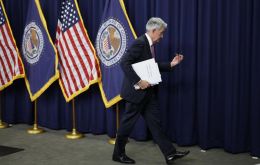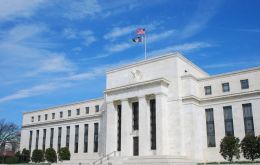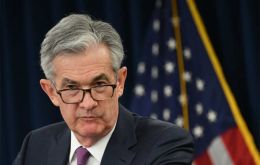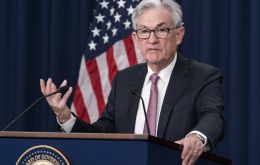MercoPress. South Atlantic News Agency
Tag: Federal Reserve
-
Thursday, September 22nd 2022 - 10:12 UTC
With Fed help and warmonger Putin, Super Dollar is stronger than the Euro

The European Union common currency, the Euro sank to a two-decade low of US$0.9810 on Thursday. It came after Russian President Vladimir Putin ordered the partial mobilization of reservists in an escalation of the war in Ukraine and after the Federal Reserve implemented a 75 basis points increase to the interest rate.
-
Thursday, September 22nd 2022 - 09:04 UTC
Fed's Powell and the unfortunate costs of reducing inflation: third 75 basis points interest rate hike

Challenged by the highest level of inflation experienced in the US in over 40 years, the Federal Reserve decided on Wednesday a third consecutive interest rate hike of 75 basis points, bringing the benchmark rate up to a range of 3.0% to 3.25% from 2.25% to 2.50%.
-
Tuesday, September 20th 2022 - 10:18 UTC
US Fed and UK BoE expected to hike interest rates this week, but how far?

The United States Federal Reserve and the Bank of England this week are scheduled to hike interest rates steeply again in a bid to tame inflation. The two central banks are expected to look through recession fears and continue their fight against extraordinary price rises.
-
Saturday, September 17th 2022 - 10:35 UTC
Will the Federal Reserve strangle Latin America again?

By Ernesto Talvi (*) – In the 1980s, the Federal Reserve’s dramatic interest-rate hikes led to a lost decade of economic growth in highly indebted Latin American countries. Today, however, the US itself is highly leveraged, which will make the Fed hesitant to pursue measures that imply severe collateral damage elsewhere.
-
Saturday, August 27th 2022 - 09:51 UTC
Federal Reserve pledges to keep lowering inflation, “until we are confident the job is done”

The chairman of the Federal Reserve, Jerome Powell said on Friday that the job of lowering inflation is not done, and “we will keep at it until we are confident the job is done”. Powell was speaking at the Fed's annual conference in Jackson Hole, Wyoming, an event closely followed by markets and pundits, trying to anticipate future actions.
-
Thursday, July 28th 2022 - 07:59 UTC
Fed raises the benchmark interest rate 75 basis points, fourth time running

For the fourth time running since March the United States Federal Reserve on Wednesday increased benchmark interest rates 75 basis points to its highest level since 2018, in yet another significant effort to contain inflation which is running at a forty-year high of 9,1%, but at the same time avoiding a recession.
-
Thursday, June 16th 2022 - 09:11 UTC
US Fed raises rates to curb growing CPI

The United States Federal Reserve Wednesday announced a 0.75% rate hike to between 1.5% and 1.75%, in a move to curb rising consumer prices. It is the first time since 1994 that the Fed has raised the rate this much.
-
Tuesday, May 24th 2022 - 10:10 UTC
Powell takes oath as Fed's chair second term; first African American woman joins US central bank

Jerome H. Powell on Monday took the oath of office for his second term as Chair of the Board of Governors of the Federal Reserve System. Vice-Chair Lael Brainard administered Chair Powell's oath in the press briefing room of the Board's Martin Building.
-
Thursday, March 17th 2022 - 10:06 UTC
Fed raises interest rate, first time since 2018, and anticipates six/seven more increases this year

The Federal Reserve announced on Wednesday it raised its target for short-term interest rates a quarter-percentage point to 0,50% and anticipated six/seven more rate increase for the rest of 2022, as the US faces the highest inflation in four decades.
-
Tuesday, January 11th 2022 - 13:45 UTC
Emerging Economies Must Prepare for Fed Policy Tightening

IMF Blog by Stephan Danninger, Kenneth Kang and Helene Poirson (*) – For most of last year, investors priced in a temporary rise in inflation in the United States given the unsteady economic recovery and a slow unraveling of supply bottlenecks.
